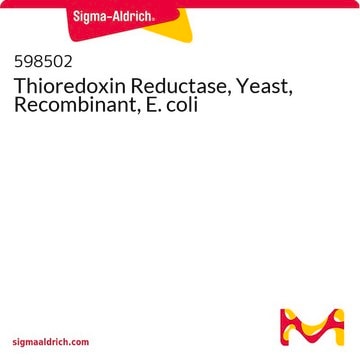CS0170
Thioredoxin Reductase Assay Kit
1 kit sufficient for 100 assays (1 mL)
Synonym(s):
Thioredoxin Reductase Activity Kit
Sign Into View Organizational & Contract Pricing
All Photos(2)
About This Item
UNSPSC Code:
12161503
NACRES:
NA.84
Recommended Products
Quality Level
usage
kit sufficient for 100 assays (1 mL)
shipped in
dry ice
storage temp.
−20°C
Gene Information
human ... TXNRD1(7296) , TXNRD2(10587) , TXNRD3(114112)
Related Categories
General description
The Thioredoxin Reductase Assay Kit uses a colorimetric assay for the determination of thioredoxin reductase activity in mammalian cells and tissues. It is based on the reduction of 5,5′-dithiobis(2-nitrobenzoic) acid (DTNB) with NADPH to 5-thio-2-nitrobenzoic acid (TNB) that produces a strong yellow color that is measured at 412 nm.
DTNB + NADPH + H+ ↔ 2 TNB + NADP+
DTNB + NADPH + H+ ↔ 2 TNB + NADP+
Application
Using post nuclear extracts of rat liver, the kit shows linearity up to 0.25 units per mL. In this preparation, ~20% of the activity is due to non-specific reductase activity (refractory to the TrxR inhibitor).
Features and Benefits
- An easy and simple method
- The kit contains all the reagents required for a colorimetric assay of mammalian thioredoxin reductase
- The kit includes an inhibitor solution for specific inhibition of mammalian thioredoxin reductase
- The kit has been tested with heart muscle, as well as lysates from cell lines such as HeLa, A549, Jurkat, U937, A431, COS, CHO, and NIH 3T3 cells
Kit Components Only
Product No.
Description
- Assay Buffer 5x for Thioredoxin Reductase 30 mL
- Thioredoxin Reductase 10 μg
- Thioredoxin Reductase Inhibitor Solution .05 mL
- 5,5'-Dithiobis(2-nitrobenzoic) acid (DNTB) 150 mg
- NADPH 25 mg
- Dimethyl Sulfoxide (DMSO) 7.5 mL
Signal Word
Warning
Hazard Statements
Precautionary Statements
Hazard Classifications
Repr. 2
Storage Class Code
10 - Combustible liquids
Flash Point(F)
188.6 °F
Flash Point(C)
87 °C
Choose from one of the most recent versions:
Certificates of Analysis (COA)
Lot/Batch Number
Don't see the Right Version?
If you require a particular version, you can look up a specific certificate by the Lot or Batch number.
Already Own This Product?
Find documentation for the products that you have recently purchased in the Document Library.
Customers Also Viewed
Melissa A Fath et al.
Clinical cancer research : an official journal of the American Association for Cancer Research, 17(19), 6206-6217 (2011-08-17)
Cancer cells (relative to normal cells) show increased steady-state levels of hydroperoxides that are compensated by increased glucose and hydroperoxide metabolism. The current study determined whether inhibitors of glucose and hydroperoxide metabolism could induce chemoradiosensitization by enhancing oxidative stress in
Francesca Magherini et al.
Oncotarget, 9(46), 28042-28068 (2018-07-03)
Au(NHC) and Au(NHC)2, i.e. a monocarbene gold(I) complex and the corresponding bis(carbene) complex, are two structurally related compounds, endowed with cytotoxic properties against several cancer cell lines. Herein, we explore the molecular and cellular mechanisms at the basis of their
Ida Landini et al.
Journal of inorganic biochemistry, 208, 111079-111079 (2020-06-05)
The antiproliferative properties of a series of structurally-related gold(I) and silver(I) linear complexes inspired to the clinically established gold-based drug auranofin were investigated in A2780 ovarian cancer cells and in their auranofin (A2780/AF-R) and cisplatin (A2780/CDDP-R) resistant counterparts. In A2780
Giulia Gorini et al.
Biomedicines, 9(8) (2021-08-28)
Au2phen ((2,9-dimethyl-1,10-phenanthroline)2Au2(µ-O)2)(PF6)2 and Auoxo6 ((6,6'-dimethyl-2,2'-bipyridine)2Au2(µ-O)2)(PF6)2 are two structurally related gold(III) complexes that were previously reported to display relevant and promising anticancer properties in vitro toward a large number of human cancer cell lines. To expand the knowledge on the molecular
Iwona Jarocka-Karpowicz et al.
Biomolecules, 10(3) (2020-03-04)
Psoriasis is a chronic inflammatory skin disease characterized by dysregulated keratinocyte differentiation, but oxidative stress also plays an important role in the pathogenesis of this disease. Here, we examined the effect of cannabidiol (CBD), a phytocannabinoid with antioxidant and anti-inflammatory
Our team of scientists has experience in all areas of research including Life Science, Material Science, Chemical Synthesis, Chromatography, Analytical and many others.
Contact Technical Service












